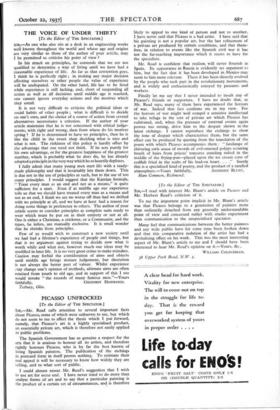PICASSO UNFROCKED [To the Editor of THE SPECTATOR.] Sia,—Mr. Read
calls attention to several important facts about Picasso, some of which were unknown to me, but which do not seem to me to affect the thesis which I put forward, namely, that Picasso's art is a highly specialised product, an essentially private art, which is therefore not easily applied to public problems.
The Spanish Government has so genuine a respect for the arts that it is anxious to honour all its artists, and therefore rightly honours Picasso, who is by far the best known of living Spanish painters. The publication of the etchings in postcard form in itself proves nothing. To estimate their real appeal it will be necessary to know how widely they are selling, and to what sort of public.
I could almost resent Mr. Read's suggestion that I wish to use art for some end. I have never tried to do more than analyse fowls of art and to say that a particular painting is the product of a certain set of circumstances, and is therefore likely to appeal to one kind of person and not to another. I have never said that Picasso is a bad artist. I have said that his painting is not a popular art, but the last refinement of "a private art produced by certain conditions, and that there- fore, in relation to events hie the Spanish civil war it has not the far-reaching importance which it seems to have for the specialists.
. Mr. Read is confident that realism, will never flourish in Spain. Its appearance in Russia is evidently no argument to him, but the fact that it has been developed in Mexico may seem to him more relevant. There it has been -directly evolved by the people who took part in the revolutionary movements, and is widely and enthusiastically enjoyed by peasants and workers.
Finally let me say that I never intended to insult any of Picasso's friends or supporters. I have no doubt that, as Mr. Read says, many of them have experienced the horrors of war. Indeed that fact confirms me in my view. For the horrors of war might well compel a sensitive intellectual to take refuge in the sort of private art which Picasso has cultivated, and, when the pressure of external events again proves too strong, drive him to the despair shown in the latest etchings. I cannot reproduce the etchings to show the tone of despair which characterises them, but the same effect can be produced by quoting from the translation of the poem with which Picasso accompanies them : " fandango of shivering owls souse of swords of evil-omened polyps scouring brush of hairs from priests' tonsures standing naked in the middle of the frying-pan—placed upon the ice cream cone of codfish fried in the scabs of his lead-ox heart. . . ." Surely this is a specialised kind of poetry, and the product of a rarefied
atmosphere.—Yours faithfully, ANTHONY BLUNT. Ham Common, Richmond.






























































 Previous page
Previous page